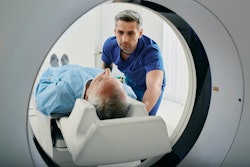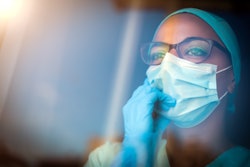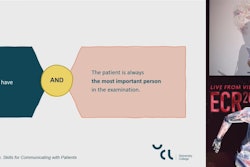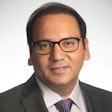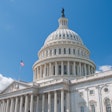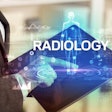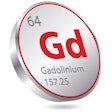Yoga could be one way to alleviate burnout symptoms in radiologists, a study published January 31 in JAMA Network Open suggests.
Researchers led by Duygu Sag, PhD, from Dokuz Eylul University Health Campus in Izmir, and Fahri Saatcioglu, PhD, from Blindern in Oslo, Norway, found that a yoga method called Sudarshan Kriya Yoga (SKY) reduced psychological distress and burnout and increased wellness in physicians, including radiologists and radiation oncologists. They also highlighted that the program is safe and practical.
“Given the high personal and financial toll of physician burnout worldwide, these findings suggest that SKY could be considered as a preventive measure or used to mitigate stress and burnout in physicians,” Sag, Saatcioglu, and colleagues wrote.
Radiologists and radiation oncologists have reported experiencing burnout, which affects their well-being as well as their personal lives and patient care quality. Burnout has also been cited as one reason these professionals choose to leave their respective workforces.
The researchers noted that with this in mind, there is an urgent need to develop and implement methods to build resiliency among healthcare professionals by mitigating burnout symptoms.
The team investigated whether SKY, a comprehensive yoga breathing and meditation-based program, can reduce psychological distress and improve physician wellness. SKY consists of simple stretching done sitting down, breathing exercises, and meditation, as well as cognitive and behavioral aspects. Sag, Saatcioglu, et al compared SKY’s efficacy to that of a stress management education training program in a randomized clinical trial.
The researchers conducted their study online between November 2021 and March 2022, including physicians from Turkey, Germany, and Dubai. Of the 129 practicing physicians included in the study, eight were radiologists, two were radiation oncologists, and two specialized in nuclear medicine. Other specialties represented included internal medicine, emergency medicine, and family medicine, among others.
Of the total physicians, 66 were randomly placed into the SKY group while 63 were placed into the stress management education training program. Both groups received 1.5 hours of training for three consecutive days through a group video conference call.
After the instruction period, participants in the SKY group practiced for about 30 minutes a day on their own and took part in a weekly one-hour, group-based, online follow-up practice. The stress management education group meanwhile reviewed and applied lessons from their training and participated in a weekly one-hour follow-up session.
The researchers used the following scales and scoring systems to measure the effectiveness of both programs: Depression, Anxiety, and Stress Scale (DASS-42), the Regensburg Insomnia Scale (RIS), the Life Orientation Test-Revised, the Professional Fulfillment Index, and a self-reported professional error questionnaire. (DASS-42 scoring is as follows: For depression, 0-9 [normal], 10-13 [mild], 14-20 [moderate]; for anxiety, 0-7 [normal], 8-9 [mild], 10-14 [moderate]; and for stress, 0-14 [normal], 15-18 [mild], 19-25 [moderate]). While there are scoring categories for "severe" and "extremely severe," the scores reported in the study did not reach these levels.
The team found that the SKY group experienced lower stress and decreased depression at post-training and post-intervention, among other advantages over the stress management education program.
| Comparison between stress management education and SKY using DASS-42 scoring | |||
|---|---|---|---|
| Condition | Stress management education | SKY | p-value |
| Depression | |||
| Baseline | 14.7 | 13.4 | N/A |
| Post-training | 12.5 | 6.8 | 0.001 |
| Postintervention | 11.8 | 6.4 | 0.001 |
| Anxiety | |||
| Baseline | 10.3 | 8.9 | N/A |
| Post-training | 7.6 | 4.5 | 0.12 |
| Postintervention | 8.1 | 4.2 | 0.02 |
| Stress | |||
| Baseline | 19.2 | 16.2 | N/A |
| Post-training | 16.7 | 9.9 | 0.006 |
| Postintervention | 15.5 | 9.5 | 0.03 |
The researchers also observed a significant decrease in insomnia from baseline to post-intervention in the SKY group (p = 0.01).
Finally, the team reported that the SKY group also showed increased professional fulfillment and decreases in work exhaustion, interpersonal disengagement, and burnout. However, it observed no effect on self-reported medical errors.
The study authors highlighted that their findings point to SKY being a practical, feasible tool to mitigate stress and burnout in other professions that may be facing similar challenges.
The full study can be found here.




